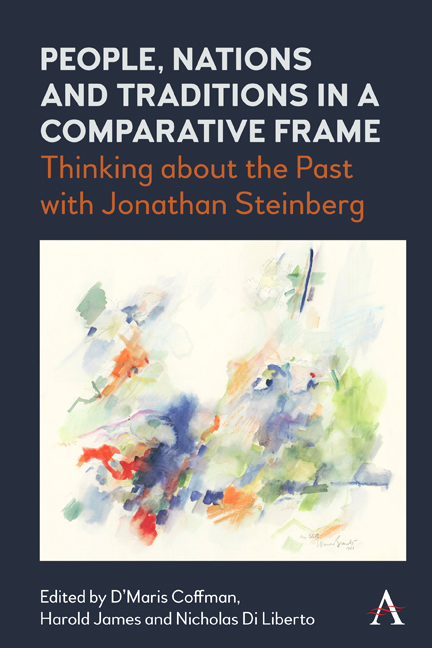 People, Nations and Traditions in a Comparative Frame
People, Nations and Traditions in a Comparative Frame Book contents
- Frontmatter
- Contents
- Foreword
- Acknowledgements
- Notes on Contributors
- Introduction
- Part One Methodological Pluralism and New Applications
- Part Two Personal and National Character
- Part Three Society, Families and the Sovereign Self
- Part Four History Out of Sync: Modernity and Tradition
- Part Five History, Narrative and the Human Condition
- Afterword
- Bibliography of Jonathan Steinberg’s Works
- Index
Chapter Six - Leslie Stephen and the Americans
Published online by Cambridge University Press: 23 February 2022
- Frontmatter
- Contents
- Foreword
- Acknowledgements
- Notes on Contributors
- Introduction
- Part One Methodological Pluralism and New Applications
- Part Two Personal and National Character
- Part Three Society, Families and the Sovereign Self
- Part Four History Out of Sync: Modernity and Tradition
- Part Five History, Narrative and the Human Condition
- Afterword
- Bibliography of Jonathan Steinberg’s Works
- Index
Summary
It is not self-evident that Leslie Stephen would be sympathetic to Americans. English writers in his day were seldom so, whether they were liberals or Tories. Sometimes this lack of sympathy took the form of ignorance, sometimes indifference. As Stephen himself observed in 1865, ‘The name of America five years ago called up […] nothing but a vague cluster of associations, compounded of Mrs Trollope, Martin Chuzzlewit, and Uncle Tom's Cabin. A few flying reminiscences of disputes about territory, and a few commonplaces about democracy, made up what we were pleased to call our opinions.’ But, usually, it was worse than this. Ever since the end of the War of 1812, there had been a dispiriting procession of intellectual English tourists, who had sailed into New York, dallied in Boston, slipped over to Niagara and ran down to Washington, all the while holding a handkerchief to their noses and muttering about the insolence of the servants, the brown stains of tobacco juice, the fanatic enthusiasms of evangelicals and democrats and the hypocrisy of slaveholders. Basil Hall was not untypical when, in the late 1820s, he made clear the wisdom of preventing the spread of democracy from the United States (where it may have been appropriate for so fickle and undeferential a people) to Britain (where matters were more intelligently ordered). Even so, he paused to wonder ‘how things go on at all, or how the men of talents and high feelings of public spirit in that country, can make headway against such disheartening obstacles’. For, after all: ‘There must in every democracy, as a matter of course, be a permanent conspiracy against property.’
Leslie Stephen was a man of high feeling and talent, not especially hostile to aristocracy and monarchy, and only moderately friendly to democracy, so one might expect from him this customary sneer. One might expect it the more from an erstwhile fellow of Trinity Hall, Cambridge, a jolly good chap who ran up and down towpaths to cheer rowers from lesser public schools, who read out puzzling passages from Deuteronomy in chapel, and walked miles and miles to dine upon mutton. Yet it was not so. He had a warmer regard for the United States than he did for any other un-English place, with the exception of the Alps.
- Type
- Chapter
- Information
- People, Nations and Traditions in a Comparative FrameThinking about the Past with Jonathan Steinberg, pp. 89 - 102Publisher: Anthem PressPrint publication year: 2021


